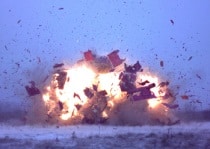 A blast wave is a shock wave : a wave that travels faster than sound, causing a sharp increase in temperature and large pressure differences . When an explosion releases a lot of energy, a shock wave is produced characterized by a sudden increase in atmospheric pressure.
A blast wave is a shock wave : a wave that travels faster than sound, causing a sharp increase in temperature and large pressure differences . When an explosion releases a lot of energy, a shock wave is produced characterized by a sudden increase in atmospheric pressure.
Due to the speed of travel of the shock wave, the air is pushed and a vacuum is produced that must be filled with more air. To adapt to the disturbance, this fluid increases its temperature and pressure violently.
The shock wave, therefore, radically modifies the temperature and pressure of the fluid through which it moves. This means that if a human being is hit by a shock wave, they can suffer serious damage and even death.
Organs, for example, can burst due to increased pressure , as can blood vessels. In this way internal bleeding occurs. Brain vessels can also burst, causing fatal strokes.
Due to these issues, in the event of an explosion , it is advisable for people to throw themselves on the ground , close their eyes and cover their ears. This allows the smallest possible amount of energy from the shock wave to be absorbed and its influence to reach especially the hardest tissues, protecting the softest and most fragile ones.
On the other hand, it is important to keep in mind that the shock wave is gradually lost on the surface of the ground, since the material dissipates it. Therefore, when a bomb is dropped, it is common to explode it before reaching the ground and thus increase its destructive power.
There is the concept of blast injury itself, and it is a type of trauma that occurs due to a sudden change in pressure, as explained above, in the context of an explosion. They not only occur when someone is near an explosive detonation, but also due to the sudden combustion of a low-powered one, a process known as deflagration .
If the explosion is caused in a small space, then the wounds are classified as compound , that is, a wound occurs in the skin that covers a bone that has also suffered damage , in this case, a fracture.
Blast injuries can be:
 * primary : they are caused by the effects of the shock wave directly when it encounters the body. Tissue damage occurs as a result of compression of the gas inside. When it exceeds the positive pressure phase, the expansion of the gas generates the release of a considerable amount of kinetic energy ;
* primary : they are caused by the effects of the shock wave directly when it encounters the body. Tissue damage occurs as a result of compression of the gas inside. When it exceeds the positive pressure phase, the expansion of the gas generates the release of a considerable amount of kinetic energy ;
* secondary : its cause is the collision against materials that are ejected in the explosion and generate trauma of various types, some of which include visible bleeding. Generally, people affected by a blast wave suffer several secondary injuries, in a proportionately greater number than the primary ones;
* tertiary : the shock wave throws the individual into the air and makes him fall violently against the ground or some solid object. Since the acceleration and deceleration values are very high, the direct force also causes trauma, which can be abdominal or craniocerebral, and adds to various fractures and bruises;
* quaternary : some experts consider them complications of conditions prior to the explosion and its respective shock wave, such as coagulation disorders or even an ongoing pregnancy. This group should also include exposure to radiation, asphyxiation and burns, among others that could qualify as "various."
